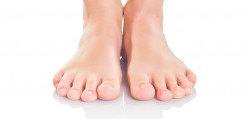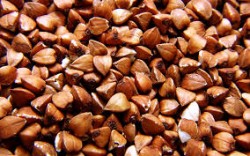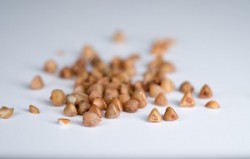May Prevent Varicose Veins
Home » May Prevent Varicose Veins
Looking forward to seeing you at the Markets!
Stop varicose veins by eating buckwheat
Can the consumption of buckwheat really prevent varicose veins? Buckwheat is a nutritious whole grain – often used by vegan and vegetarians. And, while it’s even praised by registered dieticians as a ‘heart healthy’ food – emerging research reveals that buckwheat can also prevent varicose veins.
Don’t ignore the warning signs – take care of your circulation
Varicose veins occur when the veins around the thighs or calf muscles get inflamed. This weakens the valves around the leg region and, as a result, they no longer close properly. This condition leads to poor blood flow back to the heart causing the impure blood to pool in the veins as ugly lumps.
Fortunately, there are natural ways to minimize and prevent varicose veins via nutrition. Buckwheat is shown to be one of the best natural remedies to treat this condition. Research suggests it is largely due to its nutritional and antioxidant profile, particularly with reference to its phytonutrient rutin.
The magic inside buckwheat
Researchers say the compound rutin, abundant in buckwheat is crucial for maintaining structural integrity and strength of tiny blood capillaries, arteries and veins. Rutin especially improves blood circulation and reduces inflammation in damaged veins.
In addition to rutin, buckwheat has a natural combination of nutrients that support vascular health. It contains almost 86 milligrams of magnesium – in one cup – which is vital to relax blood vessels, improve blood flow and lower blood pressure.
The primary antioxidants quercetin, hyperin, catechins and other polyphenolic compounds – including rutin – are present in the free form distributed throughout the grain as opposed to other cereal grains. This accounts for its high antioxidant activity when compared to other cereals.
Is there any science to back up the health claims of buckwheat?
A study, published in the European Journal of Clinical Pharmacology, revealed that consumption of buckwheat herb tea improved blood circulation and prevented leg edema in patients with varicose veins. A French study in the 2008 edition of the journal, Arthritis Research and Therapy highlighted the inflammation reducing capabilities of the rutin in both test tube studies as well as in rat models with chronic arthritis.
A Chinese study published in the American Journal of Clinical Nutrition demonstrated rutin’s potential to improve blood flow which enhanced vascular health. In fact, a quick search in PubMed reveals over 800 scientific papers on buckwheat.

Does it Prevent Varicose Veins?
If you are concerned with developing varicose veins, there are a few steps you can take to lower the likelihood those swollen vessels will occur. One involves a food that you are probably not eating now and may never have heard of before. Buckwheat, an inexpensive, easy-to-prepare ingredient, has also been highly touted for its many health benefits, including a lower risk for varicose veins.
Rutin – This important bioflavonoid has been shown to strengthen smaller blood vessels, promoting a healthier vascular system. At the same time, rutin may lower cholesterol, prevent blood clots and decrease your risk for some types of allergies.
The Varicose Vein Connection
Rutin is the primary substance in buckwheat found to promote a healthy vascular system and reduce the risk for varicose veins. However, other antioxidants in the seeds, such as catechins, quercetin and hyperin, are also effective in protecting the body from free radical damage that can lead to weakened blood vessels and a higher risk for varicose veins. Studies conducted in France and China discovered that regular consumption of buckwheat led to improved circulation and stronger vessels.

How buckwheat protects and heals our arteries and veins?
Buckwheat routines to produce its own protection, obrňuje eat my own water tube, which is described as the "plant vascular system." Likewise, the substance acts in our body. Reinforces and strengthens the walls of veins and arteries, helps to stop bleeding, prevent bruising, reduce bleeding from the nose and gums and helps heal hemorrhoids. People suffering from varicose veins and tiny blood vessels bursting under the skin by her had particularly befriend. It also helps with such serious problems such as gastric and duodenal ulcers. Women who suffer from heavy menstrual bleeding after long-term regular consumption of buckwheat very often record the desired improvement and relief.
Hardening of vessel walls using routine is also very beneficial to many "side effects" - one of those is certainly enhance potency in men.
Rutin is fulfilling its function in the human body, preferably in combination with vitamin C in our diet, therefore also we will include fruits and vegetables with its high content.

Best Food to Eat to Prevent Varicose Veins
Buckwheat is one of the best natural sources of the flavonoid rutin. Many nutritionists recommend foods rich in rutin to people with varicose veins due to rutin's ability to promote vascular health. It has even been hypothesized that varicose veins and spider veins could be caused by a lack of rutin in the diet. Buckwheat groats can be used to make a delicious hot breakfast porridge, and buckwheat flour (also known as beechwheat flour, kasha, and saracen corn) can be used in baked goods.
Buckwheat groats contain only 92 calories per 100 grams and are loaded with protein, which makes them an excellent food also for those who are watching their waistline. Furthermore, not only is buckwheat high in protein, but the protein it contains also includes all eight essential amino acids, all of which are needed for tissue repair.

Could buckwheat help to cure varicose veins?
There’s a lot of natural remedies recommended for the cure of varicose veins and one of the latest is buckwheat. There’s no denying this super seed delivers many impressive health benefits, but could it really be the solution you’re looking for to get rid of those unsightly veins?
What it claims to do
Buckwheat is related to rhubarb and it’s renowned for its energising and nourishing benefits. It is said to improve and regulate sleep, aid in weight loss, help lower cholesterol and prevent varicose veins.
Its benefits in the prevention of varicose veins are credited to its rutin content. This is basically a flavonoid which is thought to help strengthen the veins and lower venous insufficiency. As varicose veins are often caused because of weakened vein walls, it therefore makes sense experts would link buckwheat as a potential varicose vein prevention aid.
Will buckwheat work?
The key thing to consider here is buckwheat may have the potential to prevent varicose veins, but it will do nothing in the treatment of the condition. So, if you’re looking to treat your existing venous disease, no matter how much buckwheat you eat, it won’t make any difference.
If, on the other hand, you’re looking to prevent the condition, well, it couldn’t hurt to try it. Eating a healthy, balanced diet is part of successful varicose vein prevention, but it still won’t necessarily mean you’ll avoid developing the condition.
There are many factors which contribute to varicose vein development. Pregnancy, weight gains, heredity, and even just being older can all lead to varicose veins. Therefore, even as a preventative measure, it’s unlikely buckwheat is going to make a massive difference to your chances of developing venous disease.

Protection Against Varicose Veins and Cardiovascular Disease
Due to their high concentration of rutin, buckwheat groats are considered one of the best foods for varicose vein prevention. Rutin acts by strengthening capillary walls and might therefore also help prevent other conditions related to venous insufficiency, including hemorrhoids, cold hands and feet resulting from poor circulation, superficial thrombophlebitis, and edema.
People eating buckwheat on a regular basis may also benefit from improved cardiovascular health, as suggested by a Chinese study published in The American Journal of Clinical Nutrition in 1995. The study, which investigated the relationship between oat/buckwheat intakes and risk factors for cardiovascular disease in an ethnic minority in China, found that a higher buckwheat intake was associated with lower total cholesterol levels, lower LDL cholesterol levels, and a higher ratio of HDL to total cholesterol. The researchers concluded that buckwheat consumption may play a role in the in the prevention and treatment of both hypertension (high blood pressure) and hypercholesterolemia (high blood cholesterol).






